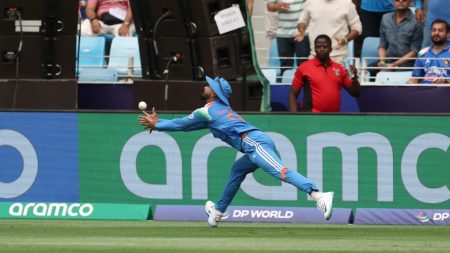A Critical Moment
"I missed a full toss. It wasn’t ideal." This succinct statement from one of the greatest contemporary batters, Steven Smith, encapsulates a pivotal moment in the match that shifted the tide in India’s favor. Smith was batting on 73 in the 37th over and seemed poised to guide Australia through the death overs. However, when he ran at Mohammed Shami, he encountered a full toss at knee-height and completely missed it, leading to the off stump being rattled. From this point, Australia managed to score only 66 runs off the remaining 75 balls, a far cry from the potential they had to post a more formidable total. Alex Carey’s valiant 61 off 57 and Nathan Ellis’s late-boundary efforts were not enough to salvage the innings. This moment, in particular, stands out as a significant turning point that set the stage for India’s dominance.
Smith Reflects on His Dismissal
After the match, Smith candidly reflected on his dismissal. "My plan was to try and put the seamers under a bit more pressure, and just rotate the spin," he explained. "But I didn’t do it very well. I lost my wicket at probably a crucial stage. Had I batted a little deeper, we could have potentially got up to near 300 or something. Alex was batting really nicely at the other end. It was a disappointing time to get out, but that’s the game sometimes." Smith’s self-critique highlights the importance of execution and the impact a single wicket can have on a team’s overall performance. His honesty underscores the competitive nature of the sport and the critical role that individual moments can play in determining the outcome of a match.
The Missed Opportunities
Australia’s total of 265 for victory seemed modest given the batting-friendly conditions at the venue. Smith acknowledged the missed opportunities: "I think we had our opportunities throughout to post something up above 300. We were probably just that one wicket down too many, at a few stages throughout the innings. If we extended one of those partnerships a little bit, we’re probably getting up to 290 to 300 and we’re putting a bit of pressure on the scoreboard." The square block had seen a lot of cricket over the past few months, and the tiredness of the pitch likely contributed to the lack of higher scores. Despite their efforts, Australia fell short of capitalizing on these opportunities, which could have made a significant difference in the context of the match.
The Condition of the Pitch
The condition of the pitch was a crucial factor in the match. Smith noted, "The square block as a whole, I think, has seen a lot of cricket over the last couple of months. We can see it’s pretty tired and that’s probably the reason why we haven’t seen a score above 300 in the tournament here. So far, so good, we did a reasonable job, but we probably just lacked a couple of those partnerships just dragging out a little bit further." The tired pitch made it challenging for batters to accelerate and post a more challenging total. This underscores the importance of adaptability and strategic play in different conditions, a skill that elite players like Smith possess but even they can struggle with at times.
Fielding Errors Amplify the Pressure
Fielding errors also played a crucial role in the match. Australia dropped Rohit Sharma twice, and Virat Kohli was put down on 51. While these were tough chances, they had significant consequences. Smith acknowledged, "I think when you’re trying to squeeze the game and you’re trying to build a lot of pressure, you need to take those chances when you’ve got 260 on the board. But that’s the game, it happens. No one means to drop a catch. It’s part of the game." The drops gave India’s batsmen crucial lifelines, allowing them to build their innings and put additional pressure on the Australian bowlers. The cumulative effect of these errors contributed to India’s eventual victory.
The Impact on the Match
In the end, the combination of Smith’s dismissal, the missed opportunities, and the fielding errors created a scenario where India could comfortably chase down the target of 265. Smith’s candid reflections and the broader context of the pitch and fielding highlight the multifaceted nature of cricket. Each element, from individual moments to collective performance, can significantly influence the outcome of a match. Despite the disappointment, Smith’s comments offer a glimpse into the mindset of a true professional, one who is always looking to learn and improve, even in the face of adversity.











